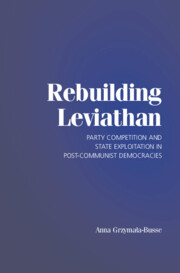Book contents
- Frontmatter
- Contents
- Acknowledgments
- List of Political Party Abbreviations and Acronyms
- 1 INTRODUCTION
- 2 COMPETING FOR THE STATE
- 3 DEVELOPING THE FORMAL INSTITUTIONS OF THE STATE
- 4 THE EXPANSION OF STATE ADMINISTRATION: PATRONAGE OR EXPLOITATION?
- 5 PRIVATIZING THE STATE: PARTY FUNDING STRATEGIES
- CONCLUSION
- APPENDIX A PEAK PARTY ORGANIZATIONS IN POST-COMMUNIST DEMOCRACIES, 1990–2004
- APPENDIX B DETERMINING STATE ADMINISTRATION EMPLOYMENT AND RATE OF GROWTH
- APPENDIX C ANCHORING VIGNETTES
- Bibliography
- Index
- Cambridge Studies in Comparative Politics
2 - COMPETING FOR THE STATE
Published online by Cambridge University Press: 05 June 2012
- Frontmatter
- Contents
- Acknowledgments
- List of Political Party Abbreviations and Acronyms
- 1 INTRODUCTION
- 2 COMPETING FOR THE STATE
- 3 DEVELOPING THE FORMAL INSTITUTIONS OF THE STATE
- 4 THE EXPANSION OF STATE ADMINISTRATION: PATRONAGE OR EXPLOITATION?
- 5 PRIVATIZING THE STATE: PARTY FUNDING STRATEGIES
- CONCLUSION
- APPENDIX A PEAK PARTY ORGANIZATIONS IN POST-COMMUNIST DEMOCRACIES, 1990–2004
- APPENDIX B DETERMINING STATE ADMINISTRATION EMPLOYMENT AND RATE OF GROWTH
- APPENDIX C ANCHORING VIGNETTES
- Bibliography
- Index
- Cambridge Studies in Comparative Politics
Summary
Everyone is trying to get ahead of his competitors, which some claim is the common ill of all democratic countries.
Nakae Chmin, A Discourse by Three Drunkards on GovernmentWhy did post-communist parties pursue state exploitation? And why do we see variation in its subsequent levels? To answer the first question, this chapter analyzes how democratic commitments and organizational resources lead parties to adopt specific strategies of survival through the state. In other contexts, these lead some parties to choose clientelism as a way of extracting state resources, while other parties prey on the state or control it by fusing the state administration with party organization.
To explain why we see variation in exploitation, this chapter looks to political competition, reconceptualized as parliamentary behavior rather than as shares of seats or turnover in office. The impact of competition on rent seeking is controversial. On the one hand, intense competition creates incentives for parties to grab resources to ensure their future success. The more intense the competition, therefore, the more exploitation we would expect to observe. On the other hand, a long tradition in both economics and politics argues that competition hinders opportunism and the seeking of excess profits or private benefits. In some analyses, the third-party benefits of competition are even its chief legitimation. We would therefore expect party competition to constrain political party opportunism. This dispute begs two questions: What kind of party competition can curb state exploitation?
- Type
- Chapter
- Information
- Rebuilding LeviathanParty Competition and State Exploitation in Post-Communist Democracies, pp. 29 - 80Publisher: Cambridge University PressPrint publication year: 2007

